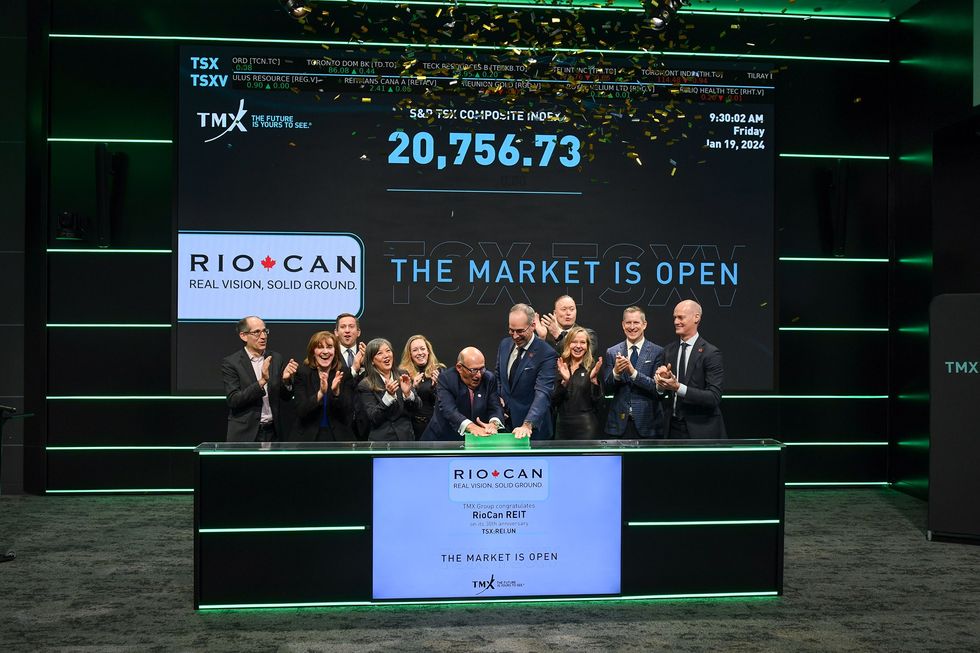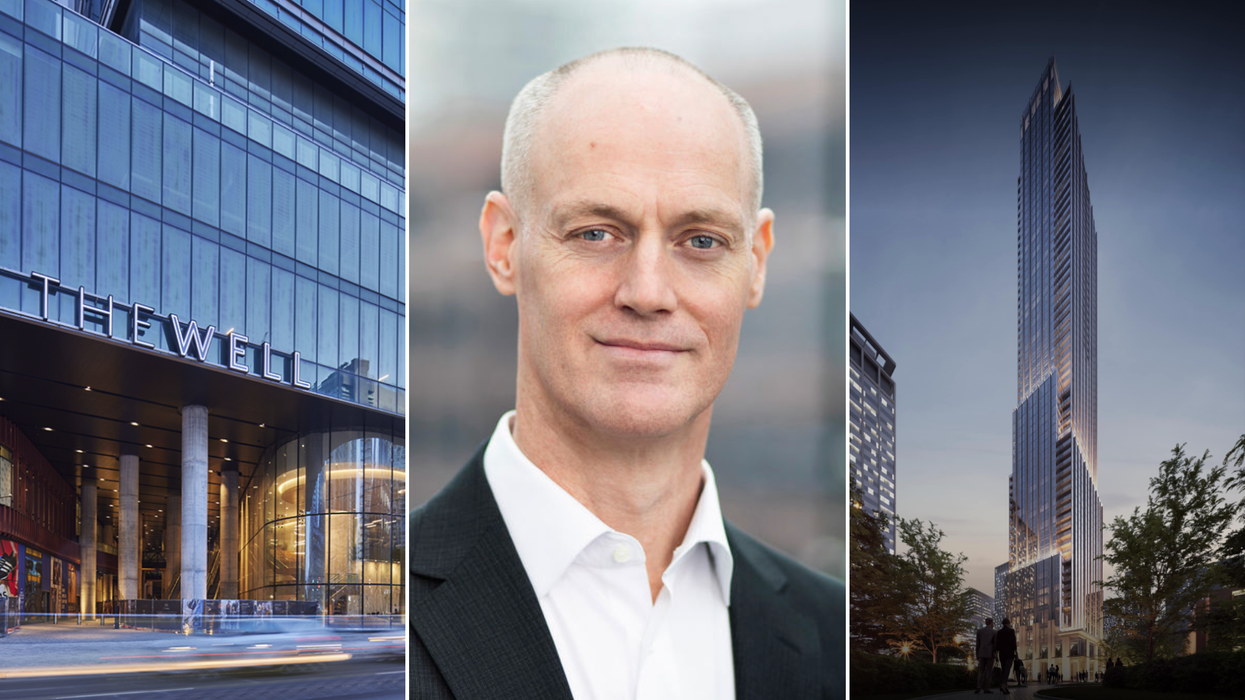Staying in business for 30 years is a feat to be celebrated for any business, but staying in business for 30 years and growing to be one of the highest valued businesses of your kind in the country is another accomplishment entirely. And that's what RioCan Real Estate Investment Trust has managed to do.
The REIT, now holding 192 properties valued at approximately $12.7B, celebrated its 30th anniversary last week with the ringing of the TSX opening bell. The major milestone comes as the company is opening up one of its largest developments to date: The Well, a multi-tower office, residential, and retail complex in downtown Toronto.
Founded by former CEO Edward Sonshine in the early '90s, RioCan is largely made up of retail real estate holdings, having built up over 30 million square feet of commercial space in its portfolio. The company has made a number of adaptive changes over the years, including venturing into the US for nearly a decade (ultimately selling its American portfolio for a very profitable $2.7B), getting into residential real estate investment in 2015, and strategically contracting its portfolio to focus on high-performing markets during more challenging times.
STOREYS spoke with COO John Ballantyne, who has spent his entire career with RioCan since its inception, to learn more about the REIT's history, its strategies for staying successful (especially in today's trying market) and what the company sees for the future of real estate investing.

STOREYS: Having been there from the start 30 years ago, how does it feel looking back on where RioCan started and where it is today?
Ballantyne: It's hard to believe it's been 30 years. People often ask me, you know, "Spending your career in one company, what is that like?" And my answer is always "It doesn't seem like RioCan has been the same company over that period of time." The company has grown, it's evolved, our portfolio has grown, it's actually contracted as well. We were down in the US for a while, which we sold out of. So the company really is a reaction to both opportunities and the down cycles in the economy. I think the power of RioCan in terms of the influence we've had on the industry is we've been so good at being proactive and predicting some of these shifts, and strategically evolving our business to make sure we're always a leader in the sector.
S: Obviously real estate is a tough game, so is there any one secret that you've found to growing such a successful REIT? Is it being adaptive, like you were just talking about?
B: It's funny you say that — "adaptive" is actually one of our core values. RioCan was really born out of a huge recession of the early '90s. It was originally a mutual fund that was converted to a REIT and, really, it was a way of helping the company survive in very dark times. Many very large real estate companies ceased to exist over that period of time. I think the secret is there was really no grand vision in the early days. It was small, it was 11 properties, it was less than a million square feet at the time. To be able to get to where it is now meant that we had to foresee a lot of these market conditions and proactively direct the company in the right direction. That can be anywhere from the recession that we started in, to the great financial crisis of 2008, to Target leaving in 2015 — we were actually their largest landlord in the world at that point in time. It was a matter of taking bad news and a temporarily bad situation turning it into something good, and that was re-leasing all of that space to better tenants and extracting a large settlement from Target. The great financial crisis helped us at the time as well.
S: That's interesting, not many people would point to the financial crisis as something that helped them.
B: It really changed our focus on capital. We would preserve it over that time and sold a lot of land that wasn't being put to good use at the time. We were able to take that capital and invest in the United States and ultimately realized a huge gain when we sold out of it.
S: RioCan's properties boast a pretty high occupancy rate — 98.3% as of the end of 2023. Is there something you attribute that to?
B: Absolutely. It's really a stronger portfolio. About seven years ago, we operated in every area of Canada, from Newfoundland right over to Victoria, BC and owned a lot of real estate in what we would call secondary markets. At that point in time, we took a look at where the growth has happened in Canada, both population and economic growth, and we understood that it was, and would continue to be, in the major markets. So, we made a disciplined decision to start selling our properties in the secondary markets. We're now subsequently about 95% major-market located and the quality of the real estate has really helped us to drive that occupancy.
S: RioCan also pivoted to start investing in residential real estate in 2015. What has that shift been like?
B: It's always a learning curve. We have developed the majority of the residential properties in our portfolio, and we've always done so with partners. We don't property manage those buildings ourselves, but we're learning from the managers how to operate residential in the most efficient, growth-oriented way. The portfolio has grown to 13 towers that have 3,000 units — we have more underway at this point in time, both on the rental side and on the condo side — and it's been it's been a success for RioCan.
S: A number of those residential developments have involved redeveloping shopping centre properties. Is that pairing of retail spaces with residential something you see continuing to happen in the future?
B: RioCan has 33 million square feet of commercial properties all across the major markets in Canada, but really, it's a land bank — 25% of the sites contain the shopping component. The rest is either parking lots or landscaping, so there's a vast amount of land that's all major-market, urban-transit located and it really gives us the ability to continue to have residential buildings throughout Canada, and more retail for that matter as well.
S: Since RioCan largely deals with retail, can you walk me through what the last few years have been like? What challenges did you face and is there anywhere you had to pivot?
B: Obviously, during the pandemic [there] was a big pivot. I mean, no one in the world expected everything to get shut down, and when you're operating close to 200 retail properties, and you're concerned about your retailers, but also the safety of consumers at the same time, it was a very difficult environment to operate in. There's always the threat of e-commerce having an impact on bricks and mortar, and at that time, it was quite frankly concerning. I think our team did an excellent job of getting us through those two years. Coming out of those two years, we had much better relationships with our tenants — much more collaborative. But there was a real renaissance of people wanting to go back to shopping centres, wanting to go to restaurants, wanting to go back to gyms that really increased the traffic to our properties and it validated the fact that people still want to shop at physical shopping centres.
S: Are there specific types of retailers that you saw perform particularly well?
B: Our portfolio is more what we would say is essential retailers, so we are largely grocery-anchored shopping centres and mixed-use urban. People need to buy groceries, people need to go to pharmacies, they need to go to banks, they need these essential providers, and that's what we have in our portfolio. They have done extremely well and they're all looking for more space.
S: A lot of institutions — RioCan included — have seen some losses of the last year, ultimately from higher interest rates, so looking forward, how do you see that playing out in the next few years?
B: At RioCan, one of our pillars is sustainable growth. We're always very careful with the balance sheet and we're very careful that we're not over leveraged. Now, to that end, interest rates grew a lot faster than anyone thought they would and in the higher-for-longer environment, it does impact your earnings. However, we have other projects on the go right now that mitigate the increased interest costs. So, we are pulling back in development right now to conserve capital a little bit, but we do see the interest rate environments getting better over the next two years.
S: Looking back on the last 30 years, is there any one project or initiative that stands out as a favourite?
B: There's always real estate that you kind of fall in love with. We have a couple of properties that were actually original properties from when we first started that we still own today, one of them being Glenmore Landing in Calgary, which I think is representative of RioCan strategies. It's been a really great shopping centre and a really strong community in Calgary. We've continued to reinvent it and to renovate it, and there's an opportunity now to actually acquire some land around the property through the city, which will give us a chance over the next 10 to 15 years of adding more housing to that area of Calgary while keeping the same shopping centre, so it's really a win-win. It's helping solve the housing crisis that we're seeing across Canada and it's also enhancing an existing shopping area where residents will be able to enjoy and the retailers will be able to be successful with having additional residential around them. Projects like that are very gratifying.
S: The Well is another major one and it seems like it's already always full of people. What has that experience of opening it up been like from your end?
B: We've been developing The Well over the last 10 years and it was a placemaking project that the city of Toronto was going to embrace. It's early days for the retail and it's all opening now, but traffic has been driven to that site just by people wanting to go somewhere and experience something different. Toronto has been remarkable and as we open up the food components over the next two to three months, it is going to be a real celebrated property in Toronto, so we're very, very proud of that.
Answers have been edited for length and clarity.





















